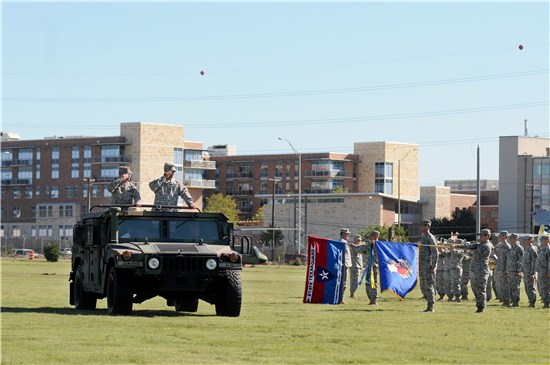
CAMP MABRY, Texas (Oct. 10, 2014) – On Saturday, Oct. 4, 2014, Brig. Gen. Gerald “Jake” Betty took command of the Texas State Guard (TXSG) from Maj. Gen. Manuel “Tony” Rodriguez at a change of command ceremony at Camp Mabry in Austin, Texas.
Governor Rick Perry announced last month that Betty would assume command upon the retirement of Rodriguez, who has commanded the TXSG since August 2012.
“Over the last two years, Gen. Rodriguez, has continued to demonstrate the integral role of the Texas State Guard to the Texas Military Forces and the people of the Lone Star State,” said Maj. Gen. John F. Nichols, Texas Adjutant General. “Rodriguez has demonstrated his leadership skills and distinguished himself in mission execution during his time in command.”
Betty joined the TXSG in January 2006, after a distinguished career in the U.S. Army and Army Reserve. Betty received his Bachelors degree from Texas A&M University and was commissioned as a Second Lieutenant in the Infantry in 1973. Upon entering active duty he was assigned to the 1st 501st Infantry Battalion, 101st Airborne Division, Fort Campbell, KY. Upon leaving active duty in 1977, he was assigned as Company Commander C-Company, 1st 143 Infantry, 36th Airborne Brigade, Texas National Guard. Additionally, in 1979 Betty transferred to the U.S. Army Reserves and held various leadership positions. In February 2003, he was mobilized to the Defense Intelligence Agency as Chief, Iraq Survey Group, Fusion Center - CONUS, in support of Operation Iraqi Freedom. He retired from the U.S. Army Reserve in 2003 after serving a total of 30 years.
During his time in the TXSG, Betty has held a number of leadership positions to include serving as the Director of Personnel and Administration for the organization headquarters. While commander of the 8th Regiment, Betty served on several State Active Duty missions for Hurricanes Dean, Gustav, Dolly, Edouard, and Ike. In March of 2013, Betty was selected to serve as Commanding General of the Army Component Command.
As commander, Betty will be responsible for the organization, training and administration of the Texas State Guard, reporting directly to the Texas Adjutant General. Currently, more than 2,200 men and women actively service in the TXSG, divided into four operational components: Army, Air, Maritime and Medical. The mission of the Texas State Guard is to provide mission-ready military forces to assist state and local authorities in times of state emergencies; to conduct homeland security and community service activities under the umbrella of Defense Support to Civil Authorities; and to augment the Texas Army and Air National Guard as required.
Betty and wife, Juli, have been married for 40 years and have two children, Josh and Alison. Their son and son-in-law proudly serve in the U.S. Army as a Major and Sgt. 1st Class.
Betty was honored to take command from Rodriguez and is ready for the next chapter of his military career.
“I am honored and humbled to be selected for this role by our commander in chief,” said Betty. “I look forward to serving our citizens of Texas.”
Prior to the change of command ceremony, Betty was promoted to Major General.